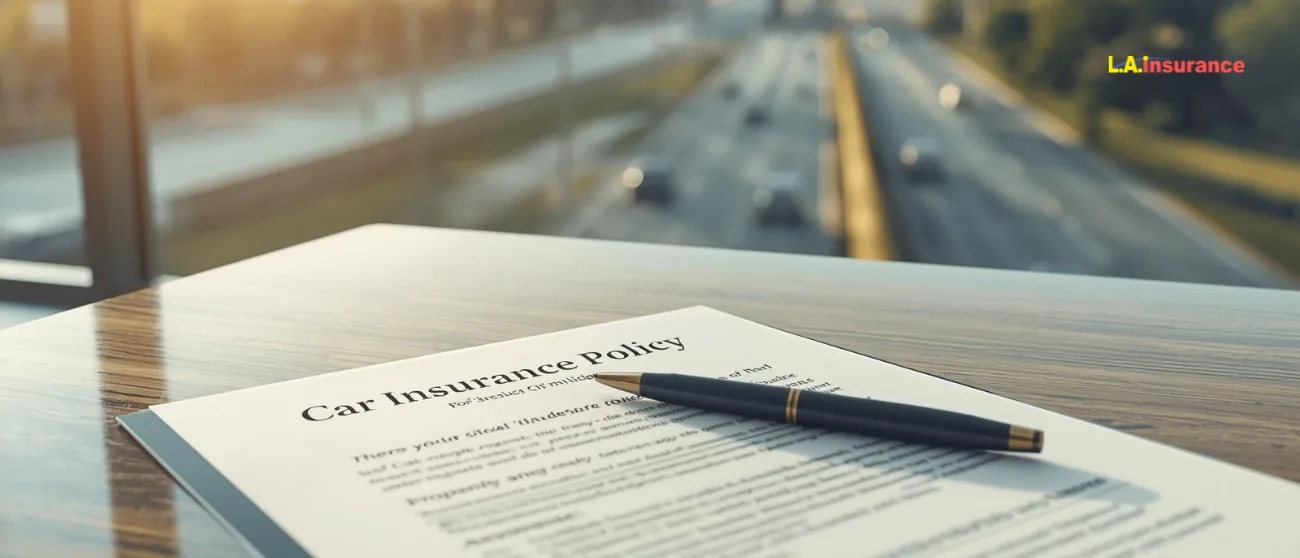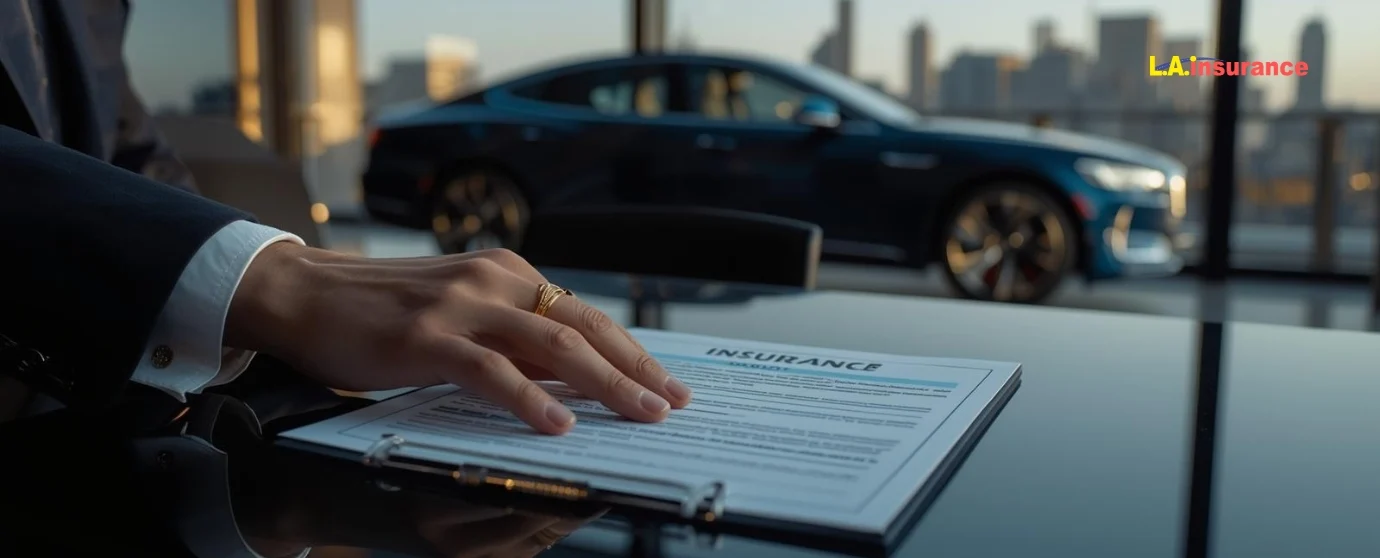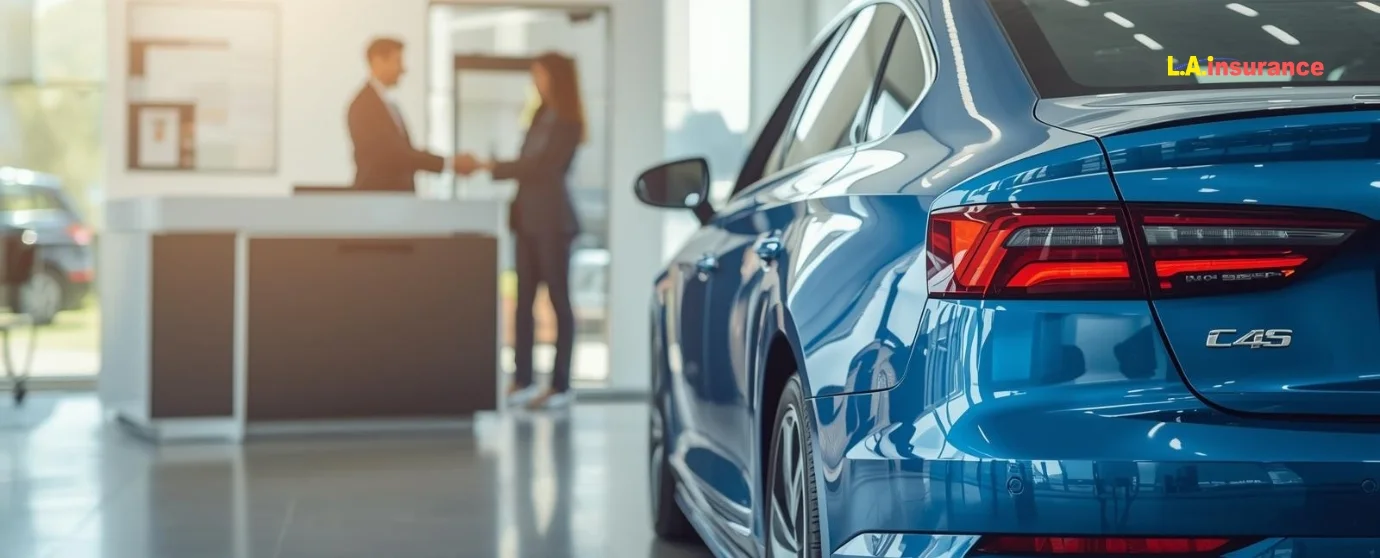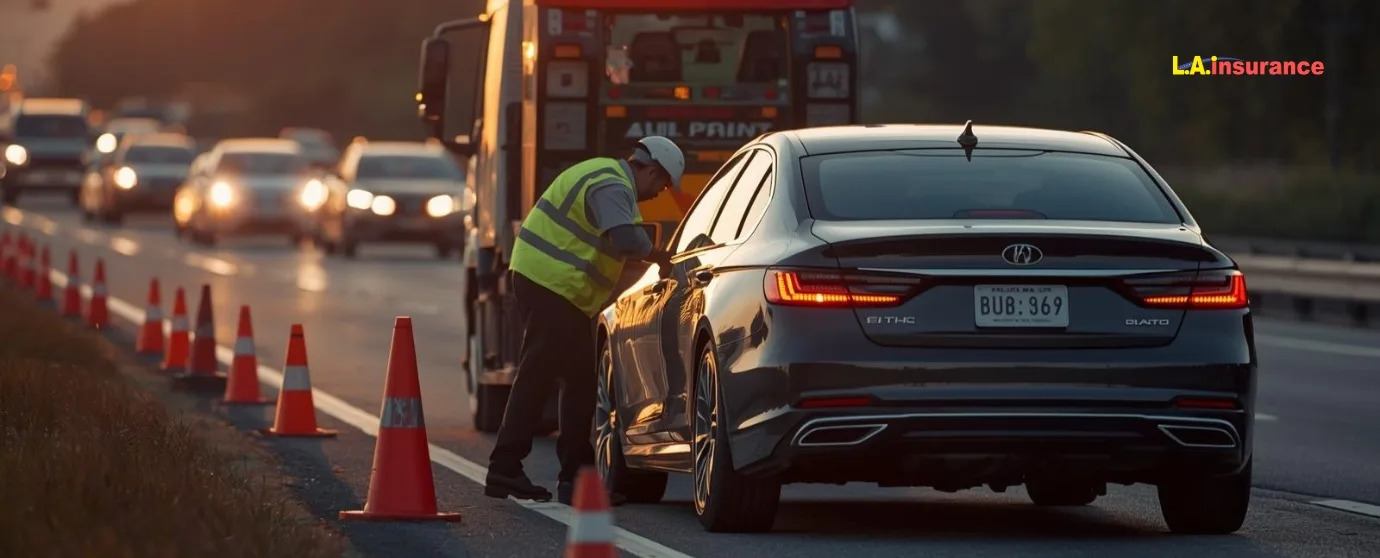
Publish Date: 20-04-2025
Auto Insurance
Last Updated: 15-12-2025
What Is Comprehensive Car Insurance and What Does It Cover?
If anything happens to your car, the first thing that comes to your mind is, "Will my insurance cover it?" The answer always depends on how the damage occurred and what types of car insurance coverage you have. For instance, if your windshield is shattered by hail or a falling tree, comprehensive car insurance would help. But if it’s shattered by a collision with another vehicle, then comprehensive car insurance won’t come in handy. In this article, we’ll simply discuss what comprehensive car insurance is and what it covers for you.
The Definition of Comprehensive Car Insurance
So, what is comprehensive car insurance? Comprehensive Car Insurance isn’t the same as liability auto insurance. It’s an optional coverage that protects your vehicle from events other than collisions. If your vehicle is damaged by vandals, stolen by someone, or dented, scratched, or broken in weather hazards, comprehensive insurance will step in and save you from spending money on repairing or replacing your vehicle. Unlike collision insurance, it doesn’t cover accidents with another vehicle or object. No one is legally required to carry it. However, lenders may require comprehensive coverage along with collision and liability coverage if you lease or have a loan on your car. Otherwise, it will remain optional.
How Does Comprehensive Car Insurance Work?
Comprehensive auto insurance is optional, but you can easily add it to your existing policy. You can file a comprehensive auto claim to get reimbursement if something bad happens to your car from non-collision events including natural disasters, hitting animals, theft, or vandalism.
You’ll first pay your deductible which is the amount you cover before your insurance company pays. For example, if a tree falls on your car and repairs cost $3,000, and your deductible is $500, you’ll pay $500 while your insurer covers the rest. Your policy pays up to your vehicle’s actual cash value (ACV), considering depreciation.
What Does Comprehensive Auto Insurance Cover?
Whether you purchased comprehensive vehicle insurance for your car, motorcycle, boat, or RV, it protects you from non-collision damages. It covers unexpected incidents beyond your control and makes sure you’re financially protected from various risks.
Here's what is covered under comprehensive insurance:
- Theft: If your vehicle is stolen, your insurance policy reimburses its actual cash value excluding the deductible.
- Vandalism: Covers damages from keying, spray paint, or intentional destruction.
- Fire: Whether from an engine fire or external blaze, repairs or replacements are covered.
- Natural Disasters: Includes floods, tornadoes, hail, lightning, wildfires, and severe storms. For instance, you can learn does car insurance cover hail damage.
- Falling Objects: Covers damages from falling trees, rocks, or debris.
- Glass and Windshield Damage: Many policies cover repairs or replacements for cracked windshields. Learn more: does auto insurance cover cracked windshield?
- Animal Collisions: If you hit a deer or other animal, repairs are covered.
- Riots and Civil Disturbances: Covers damages from looting, fires, or vandalism.
What Is Not Covered Under Comprehensive Car Insurance?
Although comprehensive auto insurance covers many unexpected damages, it doesn’t protect your vehicle from everything. You better be aware of its limitations so that you don’t feel surprised when filing a claim.
Exclusions from Comprehensive Coverage:
- Collision-related Damages: If your vehicle is damaged in an accident with another car, a pothole, or a stationary object, you won’t be covered under the comprehensive policy. For this, you’ll require collision coverage.
- Personal Injury and Medical Expenses: It won’t cover your injury, your passengers’ medical bills, or personal injury protection expenses.
- Liability for Others: If you damage another vehicle or property, comprehensive insurance won’t cover it.
- Mechanical Failures or Wear and Tear: Issues that may happen naturally over time like tire blowouts, engine failures, or windshield wipers wearing out aren’t covered.
- Belonging Inside the Car: Stolen cash, electronics, or personal items fall under home insurance or renters’ insurance instead.
- Any Intentional Damage or Fraud: Any deliberate damages caused by the owner won’t be reimbursed.
If you need to extend your coverage, we recommend getting affordable full coverage auto insurance. It’s comprised of liability insurance, collision insurance, comprehensive insurance, and sometimes uninsured or underinsured motorist insurance coverage as well.
Situations When You Need Comprehensive Insurance
Although comprehensive insurance coverage isn’t mandatory, some situations make it essential. Here’s when you might need it:
- Your car is financed or leased
- You live in high-risk areas (If your zip code has frequent theft, vandalism, or natural disaster)
- If you can’t afford out-of-pocket expenses when your car is severely damaged
- If you own a high-value or classic car.
- If you park outside or in public which increases the risks of damages from storms falling objects, and windshield damage.
- Your area faces harsh weather like hail, tornadoes, floods, or lightning.
What Are Comprehensive Coverage Deductibles and Limits
Comprehensive Insurance coverage helps pay for damages from non-collision incidents. However, it comes with deductibles and limits determining how much your insurance company will cover.
A deductible is the amount that you must pay before your insurance policy covers the rest. For example, suppose that your deductible is $700, and a storm damages your vehicle afterward. In such a case, if the repair cost is $1200, $700 falls on your shoulder and the insurance company covers the remaining $500. If you choose a higher deductible, your insurance cost will be lower. However, it also entails paying more out of pocket for a claim.
The comprehensive coverage limit, on the other hand, is the maximum amount your auto insurance coverage will pay for a claim. Usually, it depends on the actual cash value of your vehicle. However, depreciation is also taken into consideration.
For example, if your car is stolen and its cash value is $15000, your insurance will pay up to that amount, minus your deductible. However, if you want a new vehicle, it is most likely that you will have to use your own money. In that case, you can for sure put your reimbursed amount to use.
How Much Does Comprehensive Coverage Costs?
According to the Insurance Information Institute (III), comprehensive insurance is cost-effective with an average yearly cost of just over $134. However, the cost of comprehensive insurance coverage can vary and it depends on several factors.
Your zip code, vehicle type, deductible, and risk level all will affect the price. Areas with frequent theft, vandalism, or natural disasters often have higher rates.
A higher deductible lowers your insurance cost, but you’ll pay more out-of-pocket for damages. A lower deductible increases your premium, but the insurance company covers more in a claim.
Other factors include:
- Vehicle’s Actual Cash Value: Expensive cars cost more to insure.
- Credit Score and Driving History: A clean record can lower rates.
- Loan or Lease Requirements: Lenders may require comprehensive auto insurance.
Learn more about how much is car insurance. Reading this can give you an approximate idea of how much you have to pay if you want to carry a comprehensive policy along with minimum liability coverage.
What Is the Difference Between Comprehensive and Full Coverage Insurance?
Comprehensive and full coverage insurance are both different kinds of insurance policies. However, many people use these two terms interchangeably which might create confusion.
Comprehensive insurance, as you already know protects you from non-collision events. It covers theft, natural disasters, vandalism, and more. It doesn’t cover accidents involving another vehicle or object.
Full coverage, on the other hand, isn’t a separate policy but a combination of multiple coverages. It includes liability, collision, and comprehensive insurance. Having full coverage means you’re protected in more situations, both on and off the road.
What Is the Difference Between Comprehensive and Collision Insurance?
You might also want to know about what comprehensive and collision coverage exactly covers since they are two different kinds of coverage. The main difference is the cause of damage. Comprehensive insurance covers events beyond your control like theft, fire, or natural disasters. It also covers damage from animals or falling objects.
Collision insurance steps in when your car hits something. This could be another vehicle, a fence, or a tree. It’s designed for accidents where you hit an object or another car. Both coverages can work together and offer you more extensive protection.
The below table shows the major differences between comprehensive and collision insurance coverage:
Feature | Comprehensive Insurance | Collision Insurance |
What It Covers | Theft, fire, natural disasters, vandalism | Accidents with vehicles or stationary objects |
Cause of damage | Non-collision events, often uncontrollable | Collisions, regardless of fault |
Common Scenarios | Hiring a deer, hail damage, car theft | Hitting another car, crashing into a fence |
Required for Loans | Often required for leased or financed cars | Often required for leased or financed cars |
Deductible | Yes | Yes |
Payout Limit | Actual cash value of the car | Actual cash value of the car |
Coverage Focus | Events outside of driving accidents | Damage from accidents while driving |
Learn more about the difference between collision and comprehensive insurance coverage.
Is Comprehensive Coverage Worth It?
It depends. However, auto insurance experts believe that it oftens worth the investment. Keep in mind that the value of the comprehensive coverage depends on your car’s age, value, and your financial situation.
If your vehicle is newer or if it holds significant value, you can go for comprehensive insurance. It will make sure if disaster strikes, you won’t bear the full burden of repair or replacement costs.
On the other hand, if you drive an older car that has depreciated significantly, it might not be as cost-effective. In these cases, compare the cost of coverage with your car’s current value to decide if it makes financial sense.
It should also keep in mind that comprehensive coverage is mostly required if your vehicle is leased or financed. However, even if it’s optional, it can be a smart way to protect against unexpected losses that aren’t caused by accidents.
Expand Your Vehicle’s Protection with L.A. Insurance
You don’t have to struggle to find affordable comprehensive coverage for your car. Contact L.A. Insurance today. When it comes to any auto insurance coverage, we’re the most affordable insurance agency for you.
Find an agent to discuss insurance needs or contact us for personalized assistance. We’re always here to help you get the coverage you deserve at a price you can afford. Get a cheap car insurance quote right away or call us at (800) 893-9393.
Frequently Asked Questions (FAQs) on Comprehensive Car Insurance Coverage
Is it better to have collision or comprehensive?
It depends on your needs. Collision insurance covers accidents and comprehensive auto insurance covers theft, vandalism, and natural disasters. If you finance or lease a vehicle, lenders may require both. However, if you’re more prone to collision-related incidents, it would be ideal to get collision insurance. Plus, if your area faces a high crime rate, especially vehicle theft rate, fire incidents, and weather-related risks, you should also add a comprehensive policy.
Is comprehensive insurance full coverage?
No. Full coverage is not a single policy. It usually includes liability insurance, collision coverage, and comprehensive insurance coverage. These protect against different types of damages and injuries.
How do I know if I have comprehensive car insurance?
It's super easy. Check your auto policy or contact your insurance company. With some insurers, you may directly check it using a mobile app as well. It shouldn’t take more than 2 minutes. If you finance or lease, you likely have comprehensive auto insurance.
When should you drop comprehensive coverage on your car?
Consider dropping it if your vehicle is old and its actual cash value (ACV) is low. If repairs cost more than your car, comprehensive insurance costs might not be worth it.
What happens if your car gets stolen and you have full coverage?
Your comprehensive insurance will pay the actual cash value of your stolen vehicle minus your deductible. So, you may need some additional cash for a replacement.
Does comprehensive insurance cover a broken window?
Yes, if the windshield or glass is damaged from vandalism, falling objects, rocks, car fire, animal collisions, or any natural incidents that are beyond your control, your comprehensive insurance will pay for it. Some policies even offer no-deductible glass repair or replacement.
How much will a comprehensive claim raise my insurance?
Yes, your comprehensive auto claim can indeed raise your premiums.. For instance, if you hit a deer and file a claim, insurance companies assume that you’re likely to file another claim in the future. That’s why they may slightly increase the rate. However, it won’t cost you a fortune. Generally, insurers raise significantly lower amounts after comprehensive claims compared to collision insurance claims. On average, you might see an increase of under $100 per bi-annual payment.
Is hitting a pole collision or comprehensive?
Hitting a pole is covered under collision insurance. However, if a tree or wind knocks a pole onto your vehicle, comprehensive insurance covers the damages.
Editorial Disclaimer
The information provided on this blog is for general informational purposes only and does not constitute professional insurance, legal, or financial advice. Coverage and rates are subject to individual eligibility, underwriting guidelines, and state availability. For specific questions regarding your policy or to get an accurate quote, please contact a licensed L.A. Insurance agent directly. We're an independent agency and not a direct insurance carrier. For more information on how we operate and handle your data, please see our Terms and Conditions and Privacy Policy.
Tag :
Auto insurance
Comercial Auto








